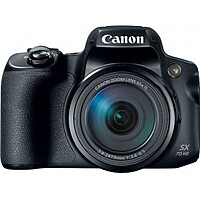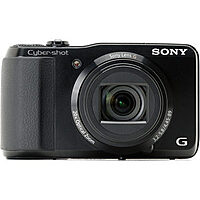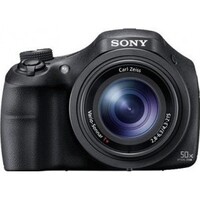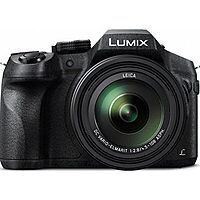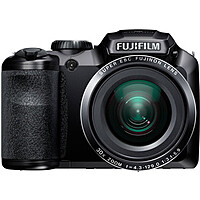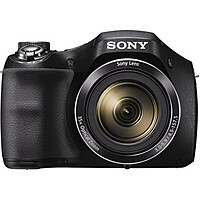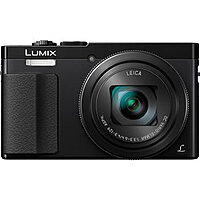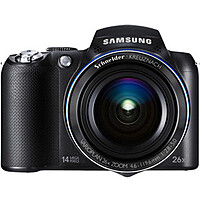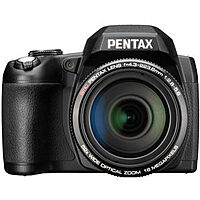Panasonic Lumix DMC-FZ80 with Leica V-Lux 2 Overview
Let's compare Leica V-Lux 2 with Panasonic Lumix DMC-FZ80.
These models are included in the Small Sensor Superzoom cameras.
Leica V-Lux 2 was released in 2010, and Panasonic FZ80 in 2017.
Lumix DMC-FZ80 is newer, which is a plus. V-Lux 2 7 years older.
The sensor resolution of V-Lux 2 is greater than that of Lumix DMC-FZ80. However, the difference of 4 MP is not very significant.
The more megapixels the camera has, the more detailed and clear the picture will be. The number of megapixels will also affect the maximum size of the photos, which then can be printed without loss of quality.
At the first camera (V-Lux 2), the minimum ISO value is lower, which gives more opportunities for shooting in daylight.
A larger maximum ISO allows you to take good pictures in the dark.
At Leica V-Lux 2, the maximum ISO is greater by 3200.
Both cameras have Optical image stabilization.
Both cameras feature a 3-inch articulated screen.
Both cameras have a electronic viewfinder.
Viewfinder Lumix DMC-FZ80 has a higher resolution of 1166k dots, V-Lux 2 has a resolution of no electronic viewfinderk dots.
Burst mode, also called continuous shooting mode, sports mode or continuous high speed mode, is a shooting mode in still cameras. Leica V-Lux 2 has 10.0 fps continuous shooting.
Leica V-Lux 2 has 10.0 fps continuous shooting.
| General |
V-Lux 2 |
Lumix DMC-FZ80 |
| Brand |
Leica
|
Panasonic
|
| Model |
V-Lux 2 |
Lumix DMC-FZ80 |
| Announced |
September, 2010 |
January, 2017 |
| Body Type |
SLR-like (bridge) |
SLR-like (bridge) |
| Lens |
| Lens Mount |
fixed lens |
fixed lens |
| Manual Focus |
|
|
| Focal Lens Multiplier |
|
|
| Number of Lenses |
0 |
0 |
| Macro Focus Range |
1 |
1 |
| Screen |
| Screen Size |
3" |
3" |
| Screen Type |
Articulated |
Fixed |
| Screen Resolution |
460k pixels |
1040k pixels |
| Touch Screen |
|
|
| Live View |
|
|
| Viewfinder |
| Viewfinder |
Electronic |
Electronic |
| Viewfinder Resolution |
no electronic viewfinder |
| Viewfinder Coverage |
n/a% |
100% |
| Viewfinder Magnification |
0.0 |
0.46 |
| Autofocus |
| AF Touch |
|
|
| AF Continuous |
|
|
| AF Single |
|
|
| AF Tracking |
|
|
| AF Selective |
|
|
| AF Center |
|
|
| AF Multi Area |
|
|
| AF Live View |
|
|
| AF Face Detection |
|
|
| AF Contrast Detection |
|
|
| AF Phase Detection |
|
|
| Number of Focus Points |
0 |
49 |
| Number of Cross Focus Points |
0 |
0 |
| Photography Features |
| RAW Support |
|
|
| Min Shutter Speed |
1/60 sec |
1/4 sec |
| Max Shutter Speed |
1/2000 sec |
1/2000 sec |
| Continuous Shooting |
11.0 fps |
10.0 fps |
| Shutter Priority |
|
|
| Aperture Priority |
|
|
| Manual Exposure Mode |
|
|
| Exposure Compensation |
|
|
| Custom White Balance |
|
|
| Image Stabilization |
|
|
| Built-in Flash |
|
|
| Flash Range |
9.50 |
14.10 |
| Flash Modes |
Auto, On, Off, Red-eye, Slow Sync |
Auto, Auto/Red-eye Reduction, Forced Off, Forced On, Forced On/Red-eye Reduction, Slow Sync, Slow Sync/Red-eye Reduction, 1st Curtain Sync, 2nd Curtain Sync |
| External Flash |
|
|
| AE Bracketing |
|
|
| AE Bracketing Range |
±2 EV |
± EV |
| WB Bracketing |
|
|
| Sensor |
| Sensor Size |
1/2.3 |
1/2.3 |
| Sensor Type |
CMOS |
BSI-CMOS |
| Sensor Dimensions |
6.08 x 4.56 mm |
mm |
| Sensor Area |
27.7 mm² |
0.0 mm² |
| Sensor Resolution |
14 MP |
18 MP |
| Max Image Resolution |
4320 x 3240 |
4896 x 3672 |
| Max Native ISO |
6400 |
3200 |
| Min Native ISO |
100 |
80 |
| Max Boosted ISO |
0 |
6400 |
| Min Boosted ISO |
0 |
0 |
| Video Features |
| 4K |
|
|
| Max Video Resolution |
1280 x 720 |
3840 x 2160 |
| Video Formats |
AVCHD Lite |
MPEG-4, AVCHD |
| Timelapse Recording |
|
|
| Microphone Port |
|
|
| Headphone Port |
|
|
| Exposure Modes |
| Multi-Segment |
|
|
| Average |
|
|
| Spot |
|
|
| Partial |
|
|
| AF-Area |
|
|
| Center Weighted |
|
|
| Connectivity |
| GPS |
None |
None |
| Wireless Connectivity |
Built-In |
Built-In |
| Bluetooth |
|
|
| HDMI |
|
|
| USB |
USB 2.0 (480 Mbit/sec) |
USB 2.0 (480 Mbit/sec) |
| Battery |
| Battery Life |
0 shots |
330 shots |
| Battery Type |
|
Battery Pack |
| Battery Model |
|
|
| Physical |
| Weight |
520 g |
616 g |
| Physical Dimensions |
124 x 80 x 95 mm |
130 x 94 x 119 mm |
| Environmental Sealing |
|
|
| Water Proof |
|
|
| Dust Proof |
|
|
| Shock Proof |
|
|
| Crush Proof |
|
|
| Freeze Proof |
|
|
| Shock Proof |
|
|
| Storage |
| Storage Type |
SD/SDHC/SDXC, Internal |
SD/SDHC/SDXC card |
| Storage Slots |
1 |
1 |
| Other Features |
| Self Timer |
|
|
| Selfie Friendly |
|
|
Interesting Small Sensor Superzoom

